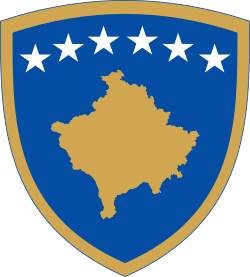Brazil's reaction to the 2008 Kosovo declaration of independence
 |
| This article is part of a series on the politics and government of Brazil |
|
| Foreign relations |
 |
| This article is part of a series on the politics and government of Kosovo |
| Constitution and law |
|
Legislature |
Kosovo's declaration of independence from Serbia was enacted on Sunday, 17 February 2008 by a unanimous vote of the Assembly of Kosovo.[1] All 11 representatives of the Serb minority boycotted the proceedings.[2] International reaction was mixed, and the world community continues to be divided on the issue of the international recognition of Kosovo. In the aftermath of the declaration of independence, Brazil declared to believe there were no legal or juridical bases that might justify the unilateral declaration of independence.
Reaction
In February 2008, the Brazilian government reaffirmed its belief that a peaceful solution for the issue of Kosovo must continue to be sought through dialogue and negotiation, under the auspices of the UN and the legal framework of UNSCR 1244. In his recent declarations, the Foreign Minister, Celso Amorim, defended that Brazil should await a UNSC decision before defining its official position on the matter of Kosovo's independence.[3][4]
In September 2009, Ambassador of Brazil to Serbia Dante Coelho de Lima said that "Our fundamental position is that we respect Serbia's territorial integrity. We supported Security Council resolution 1244, under which Kosovo is a part of Serbia. We also think that the principle of self-determination should not run counter to respect for international law".[5]
In a 4 December 2009 hearing at the ICJ, the Brazilian delegation said that the unilateral declaration of independence ignored not only the authority of the UNSC, but also the principle of protecting the territorial integrity of states. There is no basis to justify the unilateral declaration of independence in the UNSC resolution 1244 because it predicted a solution agreed by both parties. Since such an agreement was not reached, the Kosovo dispute can be decided only by the UNSC.[6]
References
- ↑ Kosovo MPs proclaim independence, BBC, 2008-02-17
- ↑ Transkript: Nga Seanca Plenare e Jashtëzakonshme Solemne e Kuvendit Të Kosovës Me Rastin e Shpalljes Së Pavarësisë, Të Mbajtur Më 17 Shkurt 2008, Republic of Kosovo Assembly, 2008-02-17 (in Albanian)
- ↑ Brasil não reconhece Kosovo sem acordo com Sérvia, Grupo RBS, 2008-02-22
- ↑ Brasil não reconhece Kosovo sem acordo com Sérvia, Canal Rural, 2008-02-22 (in Portuguese)
- ↑ Brazil to take part in ICJ hearings Archived November 4, 2013, at the Wayback Machine., B92, 2009-09-04
- ↑ MSP, dan četvrti, RTS, 2009-12-04 (in Serbian)